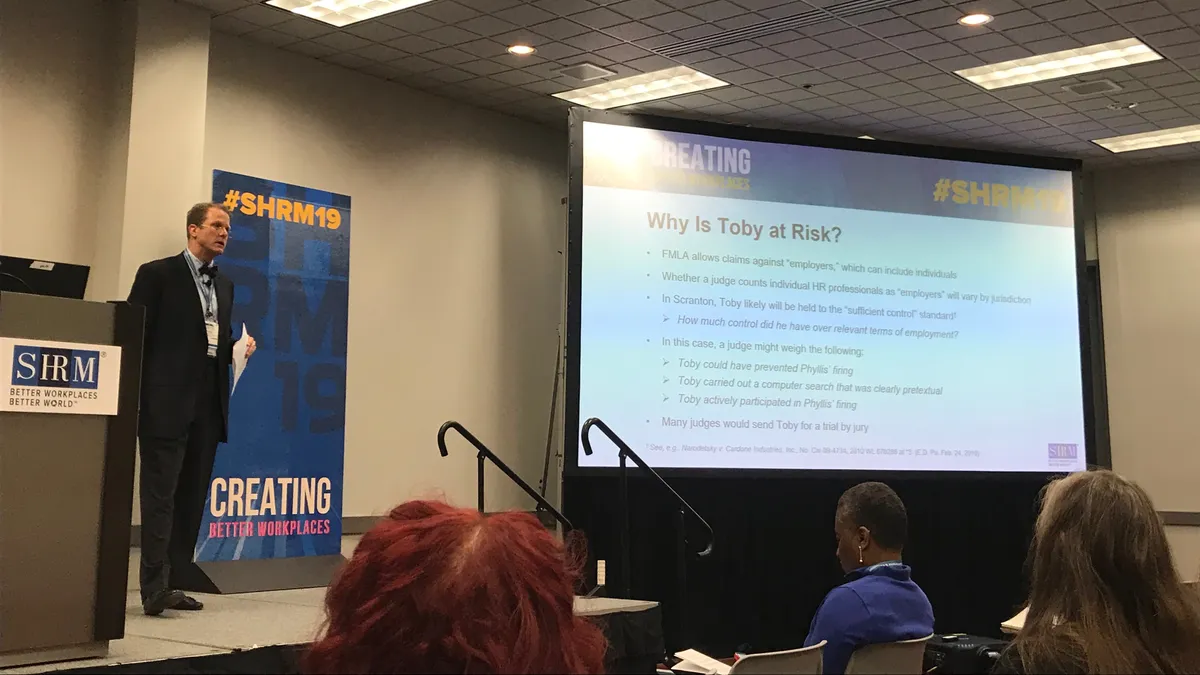LAS VEGAS — When HR professionals don't stand up, they could face serious legal consequences under certain federal laws.
That was the message R. Scott Oswald, managing principal at The Employment Law Group, told attendees at the Society for Human Resource Management's annual conference on Tuesday. But the act of doing so isn't necessarily straightforward, he noted, and there are steps professionals can take to guard themselves against individual liability.
"We as HR professionals ... are a special breed," Oswald said. "And when it comes to an investigation, we know about wrongdoing in the workplace, we have an obligation to act, most courts will say. And certainly, most jurors believe that."
The list of laws includes, but is not limited to, the Family and Medical Leave Act, the Occupational Health and Safety Act, Section 1981 of the Civil Rights Act of 1866 and the Foreign Corrupt Practices Act. Oswald highlighted a few specific best practices for ensuring compliance under these laws.
Document, document, document
Employment law experts have previously told HR Dive that documentation is key to establishing an effective defense in the event of a lawsuit, but it is equally critical in allowing HR pros to prove they oppose a decision that could be viewed as retaliatory, discriminatory or otherwise.
Oswald said this component is particularly important among focus groups of jurors. "What I hear all the time is, if it's not in writing, it didn't happen."
Usually, the first step to respond when being asked to do something illegal at work — outside of something that would cause imminent employee harm, fraud or criminality — is an internal disclosure, Oswald said.
An audience member recounted a story in which a company president told her to fire an employee because the employee had filed a sexual harassment lawsuit — she refused to do so. Oswald agreed with that decision and suggested language for a follow-up to such a situation.
"One thing you might do is send the, 'thank you very much for our time together' email," Oswald said. He emphasized that the email should start with a statement of loyalty, and that the HR professional appreciates the number of years they've had with the company. It should also make a definitive statement why the individual can't do what has been asked of them, he said.
"Guess where that email is going to go? To me," Oswald said. "And guess what I'm going to say? You cannot fire this HR professional. In fact, we've got a very serious problem on our hands here."
Documentation isn't easy, Oswald said, but he emphasized starting from a place of loyalty, and talking about why the problematic request can't be fulfilled. "And make sure you keep a copy," he added.
Practitioners should also make it clear that they respect both their own roles and the roles of those they report to, Oswald said, while also stating that what they've been asked to do is potentially illegal. "You don't have to say that it is illegal. You can simply say, 'I worry that it is. I worry about what the consequences of this action would be on the company.'"
"That's going to hold you in the same stead under the law, the same protections under the law," he added.
Don't let things get worse
Oswald recommended acting right away when presented with a complaint. HR should put a plan in place and distribute that plan among the management chain.
"'Here's what I think we ought to be doing,' so that if ultimately, there's a choice to use a different investigation protocol, for example, you've gone on record about how you believe the investigation should proceed," Oswald said. He recommended tying such recommendations back to the organization's employee handbook.
"It's not only a good practice, but required by the law," he said. "Follow your company's own handbook."
And if the company doesn't have a handbook per se, Oswald advised following whatever written policies or guidelines are available. "When something is in writing, it's a protocol or it's a policy," he said. "That's what the courts are going to look at."
Whistleblowing may be an option
There are some situations in which it might make sense for an HR practitioner to consider whistleblowing, Oswald said. Those at publicly traded corporations have a "statutorily provided conduit" to do so, namely the audit committee of a company board.
This option may be more pertinent if there is an immediate threat of danger, be it physical or otherwise, in the workplace, or if taxpayers or investors are being defrauded by what is happening in the workplace, Oswald said. HR professionals also have an obligation to report crimes, he added.
"Know that our laws incentivize integrity," Oswald said. "They will provide for protections but also, potentially, rewards."





















